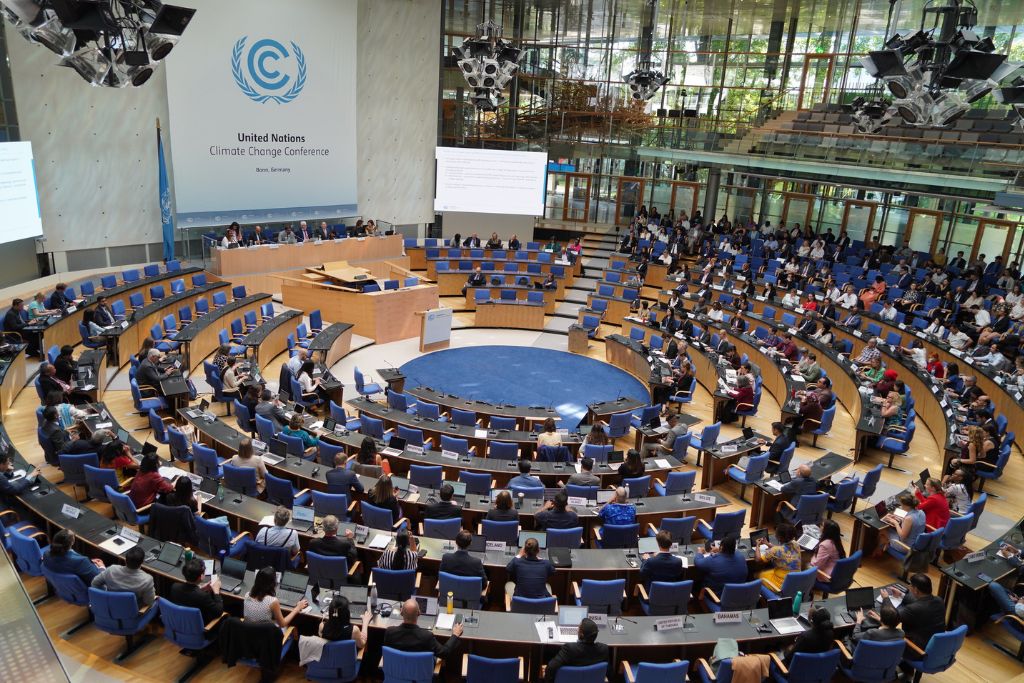Finance for mitigation and adaptation efforts and a lack of ambition from this year’s COP summit hosting country were major stumbling blocks at the 10-day Bonn climate talks.
—
Negotiators wrapped up ten days of talks at the Bonn climate summit on Thursday, as tensions over the COP28 hosting nation and its president’s link to the fossil fuel industry continue to build.
Delegates gathered in the German city to discuss two major points: A plan to accelerate emissions reductions in the upcoming summit’s agenda and a clear message from the United Arab Emirates (UAE) – this year’s COP host – on its stand in climate negotiations. At last year’s COP27 in Glasgow, the oil-rich nation reiterated that oil and gas are key to a smooth energy transition and assured that it will keep providing fossil fuels to countries around the world “for as long as the world needs it.”
Another big point of conflict in Bonn was the prominence of climate finance – financial support wealthy countries provide to support developing countries in climate change mitigation and adaptation actions. Despite approving a draft agenda, negotiators from industrialised and developing nations could not reach an agreement on how to finance mitigation efforts in the latter.
Speaking to DW, head of global political strategy at Climate Action Network International Harjeet Singh said he was “deeply disappointed” at the talks’ outcome and that countries “cannot afford any further delay.”
In a statement, Director of the World Resources Institute’s International Climate Action David Waskow described the progress made in Bonn as “underwhelming on nearly every front”, identifying one main culprit: money.
“Developing countries are increasingly frustrated that funds promised to implement their climate plans is not materializing. Despite finance not being on the official agenda, it clearly cast a shadow over the negotiations,” he said.
Bonn meetings, which take place every year, are a crucial part of the bigger UN Conference of the Parties (COP), as negotiators gather to set out an agenda for the November summit. At last year’s Bonn climate talks, Egypt made a strong case for finance, ultimately leading to a historic deal for a loss and damage fund at COP27.
The meeting was the last major chance for delegates to meet ahead of COP28 in Dubai. Here, delegates will complete a two-year process for taking stock of the implementation of the Paris Agreement with the aim of assessing the world’s collective progress towards capping global temperature rise, also known as the Global Stocktake. The first such process got underway at the 2021 COP26 in Glasgow and will conclude this November.
“With the Global Stocktake now formally shifting from the technical to political phase, the UAE COP Presidency must play a central role in building trust, bridging differences, and spurring ambition so that COP28 delivers what is needed – a rapid response plan to tackle the climate crisis. This opportunity at Dubai cannot be squandered,” said Waskow.
Despite a promising opening speech in Bonn last week, during which COP28 President Sultan Al-Jaber said that “the phase-down of fossil fuels is inevitable”, world leaders and climate advocates are highly concerned about the negative influence he might have on negotiations in November, given his strong ties to the oil industry. Last month, 133 MEPs, senators, and representatives from the United States and the European Union appealed to the heads of their countries and the United Nations to take a step back on the appointment of Al-Jaber as COP28 chief, a decision that has been controversial from the start.
As the Bonn meeting came to an end, UN Secretary-General Antonio Guterres delivered a powerful speech on the urgency of tackling the root cause of the climate crisis – fossil fuels.
“Fossil fuel companies must … cease and desist influence peddling and legal threats designed to kneecap progress. I am thinking particularly of recent attempts to subvert net zero alliances, invoking anti-trust legislation,” he said.
“Governments are pivotal in setting the record straight. They must help by providing clear reassurance. Collective climate action does not violate anti-trust – it upholds the public trust.”
The fossil fuel industry is at the heart of the climate crisis.
The problem is not simply fossil fuel emissions. It’s fossil fuels—period.
Countries must progressively phase them out, moving to leave oil, coal & gas in the ground—and massively boost renewable investments.
— António Guterres (@antonioguterres) June 16, 2023
Despite pledges and commitments from governments around the world to cap global warming below 1.5C, a UN report published last year found that the world is already on track to exceed the feared 2C mark by 2030. Global temperatures briefly exceeded 1.5C above pre-industrial levels for the first time during the first days of June.
Featured image: UN Climate Change/Flickr
You might also like: Did COP27 Succeed or Fail?


















